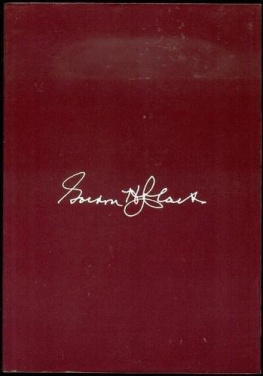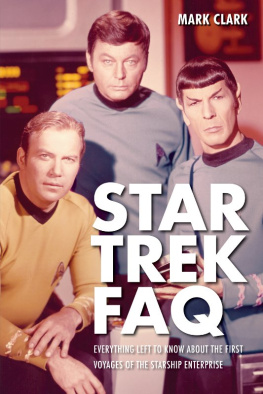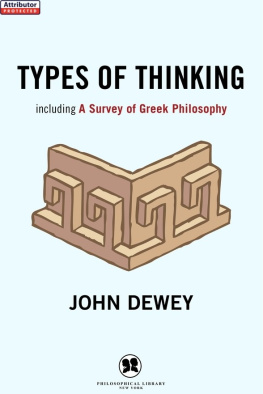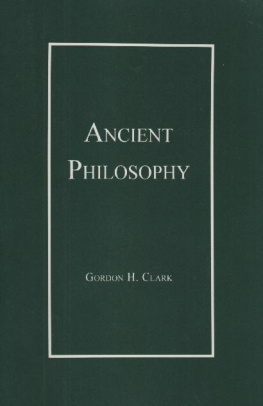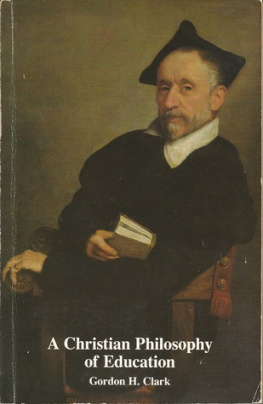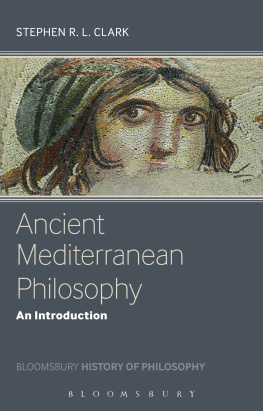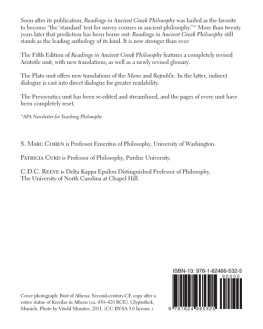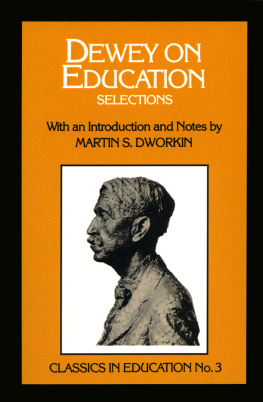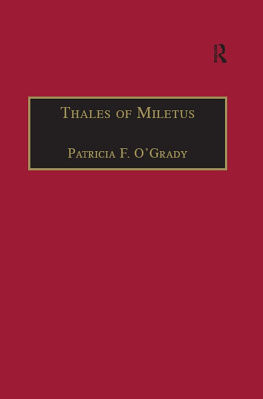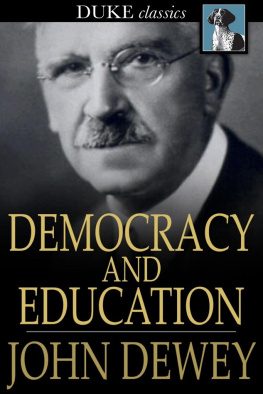Clark - Thales to Dewey : a history of philosophy
Here you can read online Clark - Thales to Dewey : a history of philosophy full text of the book (entire story) in english for free. Download pdf and epub, get meaning, cover and reviews about this ebook. City: Jefferson, Md, year: 2000, publisher: Trinity Foundation, genre: Religion. Description of the work, (preface) as well as reviews are available. Best literature library LitArk.com created for fans of good reading and offers a wide selection of genres:
Romance novel
Science fiction
Adventure
Detective
Science
History
Home and family
Prose
Art
Politics
Computer
Non-fiction
Religion
Business
Children
Humor
Choose a favorite category and find really read worthwhile books. Enjoy immersion in the world of imagination, feel the emotions of the characters or learn something new for yourself, make an fascinating discovery.
- Book:Thales to Dewey : a history of philosophy
- Author:
- Publisher:Trinity Foundation
- Genre:
- Year:2000
- City:Jefferson, Md
- Rating:3 / 5
- Favourites:Add to favourites
- Your mark:
- 60
- 1
- 2
- 3
- 4
- 5
Thales to Dewey : a history of philosophy: summary, description and annotation
We offer to read an annotation, description, summary or preface (depends on what the author of the book "Thales to Dewey : a history of philosophy" wrote himself). If you haven't found the necessary information about the book — write in the comments, we will try to find it.
Classic
Clark: author's other books
Who wrote Thales to Dewey : a history of philosophy? Find out the surname, the name of the author of the book and a list of all author's works by series.
Thales to Dewey : a history of philosophy — read online for free the complete book (whole text) full work
Below is the text of the book, divided by pages. System saving the place of the last page read, allows you to conveniently read the book "Thales to Dewey : a history of philosophy" online for free, without having to search again every time where you left off. Put a bookmark, and you can go to the page where you finished reading at any time.
Font size:
Interval:
Bookmark:
Thales to Dewey
A History of Philosophy
The Works of Gordon Haddon Clark
Volume 3
The Trinity Foundation

Thales to Dewey
A History of Philosophy
Copyright 1957
Lois A. Zeller and Elizabeth Clark George
Fourth edition 2000 John W. Robbins
Published by The Trinity Foundation
www.trinityfoundation.org
Table of Contents
Foreword
W hen Thales to Dewey first appeared in 1957, published by a major academic publisher, it met with immediate acclaim as brilliant and masterly. Gordon H. Clark, then Chairman of the Department of Philosophy at Butler University, was already recognized as one of the nations most competent interpreters of ancient philosophy, and his exposition and analysis of medieval and modern philosophy were equally incandescent. Thales to Dewey quickly became a standard college text in both Christian and non-Christian institutions.
Now this fourth edition is being issued, in the hope that it will once again become a standard text for college students. Anyone who opens the book and reads the first arresting sentence will be enthralled by both Dr. Clark and philosophy.
There are very few histories of philosophy written by Christians, and it is fair to say that the book you hold in your hands is the only such history in English that has escaped the corroding influence of secular philosophy, especially the philosophy of empiricism. In recent years others have attempted to write histories of philosophy, but they are neither so familiar with the subject as was Dr. Clark, nor so rigorous in their understanding of Christianity. The result is that Thales to Dewey stands alone among one volume histories of philosophy. It is eminently readable, consistently entertaining, unfailingly accurate, and uncompromisingly Christian. It deserves to be consulted continually by both the first year philosophy student and the aging professor.
When The Trinity Foundation began publishing and republishing Gordon Clarks books in 1980, it was with the hope that they would be used by God to raise up a new generation of Christian intellectuals who are unafraid of studying, debating, and refuting the secular philosophies that so many of their fathers either feared to discuss or thoughtlessly embraced. That hope has not been disappointed.
For too long the phrase Christian intellectual has had an odd sound, almost a contradiction in terms, at least an oxymoron. Now, however, by the grace of God, the situation is changing, and a generation of new intellectuals, Christian intellectuals, is rising. The publication of this fourth edition of Thales to Dewey is in response to their demand for a reliable guide to the history of philosophy.
The outline of Dr. Clarks philosophy may be seen in Thales to Dewey , for it forms the framework for his analysis of secular philosophers, but the complete statement of that philosophy must be found in his other books. We hope that Thales to Dewey will not be the end of the readers interest in philosophy, but merely the beginning. But whether end or beginning, no better introduction to philosophy could have been chosen than Thales to Dewey .
John W. Robbins
Preface
There are many good histories of philosophy, but they are not all good for the same purpose. Obviously, berwegs Grundrisse is unsuitable as a college text and exceeds every normal notion of Grundrisse . Other works of long and high standing, complete, profound, professionally admirable, fail to excite college undergraduates.
Within the college field the various authors solve their problems in various ways. One may decide to take note of every philosophic writer, major and minor, and the result is a sort of encyclopedia. Such a book may contain valuable prcis of a hundred or even two hundred philosophers; but it would seem that the breadth of coverage adds to the depth of confusion, if a student tries to cover the whole in one year. Another author may try a different method. Not only will he reduce the number of names, but he will also try to bring philosophy down to the level of the students understanding. This process of dilution can go and has gone to the extent of suppressing the subject matter. Something may be thus brought to the level of the student, but it is not philosophy; and education has become a facade of dilettantism.
The present volume, rather than trying the impossible bringing philosophy down to the students level makes the difficult attempt of bringing the student up to philosophys level. Two principles of restriction control the procedure. To avoid confusing the students with a multiplicity of strange names, the number of men discussed has been kept to a near minimum. Then, too, the subject matter has been restricted. There was not even a temptation to cover all the theories of any one philosopher. If, in the case of Aristotle, for example, a few lines are given to his logic, a paragraph to his physics, a bit of explanation for his De Anima , a footnote on the Metaphysics, a brief mention of ethics and politics, and the whole concluded with a flourish of poetry, the chapter, if accurate, would be unintelligible; or, if inaccurate, as is more likely, would not be worth reading.
In opposition to these horrible possibilities, the aim here has been to give a fairly thorough comprehension of a few major issues. On the principle that a reasonably clear grasp of one problem is better than a dim and faulty memory of a hundred, it might be said that the present work is predominantly concerned with questions relating to the problem of knowledge. At certain points, of course, as in the case of the Sophists, Augustine, and modern Pragmatism, ethics comes to the fore because the epistemology of these men is in one way or another determined by their ethics. And thus, for what seemed good reasons, several subjects were interwoven with the main epistemological theme.
The restriction of names and of subject matter is easy enough. Providing the student with an opportunity for thorough comprehension is far more difficult. To the best of my ability I have used the simplest and clearest language consistent with precision; illustrative material to encourage the casual student has been developed over years of teaching; expressions of opinion were included to provoke the instructor; and like any other author I can only hope that the result will meet with a measure of success.
Acknowledgment is made to the President and Board of Directors of Butler University for a sabbatical leave during which this book was brought to completion.
Gordon H. Clark
I. Greek Philosophy
1. The Presocratics
Greek philosophy began on May 28, 585 B.C. , at 6:13 in the evening.
What Is Philosophy?
Behind this partly serious and partly facetious assertion lurk several puzzling problems that require some introductory remarks. The beginning student asks, What is philosophy? Is it true that there was none before 585 B.C. ? And for what mysterious reason did it begin at precisely 6:13 p.m.?
The first two questions are intimately related. Assuredly something that had not existed previously was in evidence after 585; but whether or not this new something was philosophy is a matter of definition. Popular opinion usually connects the word philosophy with a manner of life. The phrase in which, more than in any other, most people have come across this word is the phrase, a philosophy of life. Ordinarily this means anything from the habitual thoughtless living of the least intelligent individuals, through the principles deliberately chosen by men of affairs, on to the convictions of those who resolutely turn their backs on the interests of this world and retire into monasteries or gain the reputation of Seer by practicing Yoga. In this meaning Solomon and Abraham had a philosophy; it was not something new in 585 B.C.
Next pageFont size:
Interval:
Bookmark:
Similar books «Thales to Dewey : a history of philosophy»
Look at similar books to Thales to Dewey : a history of philosophy. We have selected literature similar in name and meaning in the hope of providing readers with more options to find new, interesting, not yet read works.
Discussion, reviews of the book Thales to Dewey : a history of philosophy and just readers' own opinions. Leave your comments, write what you think about the work, its meaning or the main characters. Specify what exactly you liked and what you didn't like, and why you think so.

